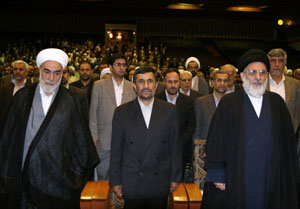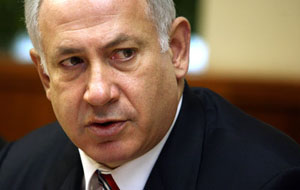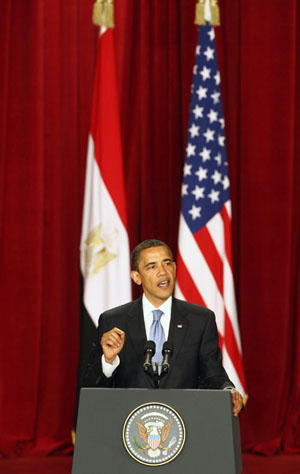Barack and the Barricades
By Mahir Ali | News & Politics | Opinion | Viewpoint | Published 15 years ago
Hopes that Barack Obama’s presidency would lead to significant changes in the way the United States conducts itself in the Middle East were tempered by the realisation that numerous domestic and international considerations would prevent him from making a clean break with the past, even if he were so inclined. When he spoke about extending a friendly hand and inviting the Muslim world to unclench its fist, it was just a gesture — albeit not a gesture one could imagine Obama’s predecessor making with even a modicum of sincerity.
But then, the incumbent is simply incapable of sounding like George W. Bush. Obama’s eloquence and intelligence are, however, no guarantee that he does not speak with a forked tongue. In the wake of his Cairo oration early last month, which was intended as a significant exercise in reaching out to the Muslim and Arab worlds, one of the commonest critiques revolved around the pertinent but rather obvious point that words are not enough and, no matter how pleasant their texture, they are bound to ring hollow until matched by actions.
At the same time, regardless of the quality of Obama’s intentions and the extent of his capabilities, no one can sensibly contend that his major goals ought to have been achieved within six months of entering the White House. He is neither a messiah nor a miracleworker — which, mind you, are not qualities claimed by his supporters but, rather, attributes ridiculed by his detractors. The latter include the neoconservatives who helped to make such a mess of the Bush presidency, as well as the Al-Qaeda types who facilitated some of that administration’s darkest deeds.
 It is, therefore, hardly surprising that both these elements were keen to undermine Obama’s overture to the Muslim world. Osama bin Laden (or someone pretending to be him) and Ayman Al Zawahiri attempted a pre-emptive strike via audio recordings in which they warned against heeding the new American message. Their evident desperation was clearly a reaction to Obama’s potential appeal, and thereby a bonus for him. It would have been thoroughly embarrassing for the US if, instead, bin Laden and Zawahiri had given an indication of softness towards the president.
It is, therefore, hardly surprising that both these elements were keen to undermine Obama’s overture to the Muslim world. Osama bin Laden (or someone pretending to be him) and Ayman Al Zawahiri attempted a pre-emptive strike via audio recordings in which they warned against heeding the new American message. Their evident desperation was clearly a reaction to Obama’s potential appeal, and thereby a bonus for him. It would have been thoroughly embarrassing for the US if, instead, bin Laden and Zawahiri had given an indication of softness towards the president.
And it might have been equally unnerving if the neocons had decided to back Obama’s initiative. True to form, they accused him of selling out and of bending over backwards to please Muslims in general and Arabs in particular. And even though Obama made no concessions in the context of his nation’s special relationship with Israel, many Zionists, too, were upset with the balance he sought to strike by conceding that the plight of the Palestinians was unacceptable, and unequivocally criticising the expansion of Jewish settlements on Palestinian territory.
The neocons were particularly galled by Obama’s praise for the historical achievements of Muslim civilisation and his admission that the US role in the Middle East left a great deal to be desired. He lamented the gratuitous invasion of Iraq but described Saddam Hussein’s removal from the scene as gratifying — which isn’t necessarily a contradictory set of opinions. And he did not ignore the Afghan conundrum; his attitude in the Af-Pak context is certainly open to criticism, but it is invariably expressed in a language that is neither inane nor particularly incendiary.
 As a presidential candidate, Obama was appalled when military officials informed him that they did not have an exit strategy in Afghanistan. If one exists now, or is under preparation, it isn’t public knowledge. But even the realisation that the US president recognises the need for one is a step forward, although the appointment of notorious Iraq veteran General Stanley McChrystal as the commander of US forces in Afghanistan has prompted serious concerns about what lies ahead, given his reputation for extreme brutality. At the same time, while the drone attacks continue in Pakistan’s north-west, the Obama Administration appears to have had considerably greater success than the predecessor regime in convincing Islamabad to take the fight to the Taliban — some of the consequences are unpalatable and portentous, but permitting the latter to establish their writ across increasing expanses of territory could hardly be construed as a preferable alternative.
As a presidential candidate, Obama was appalled when military officials informed him that they did not have an exit strategy in Afghanistan. If one exists now, or is under preparation, it isn’t public knowledge. But even the realisation that the US president recognises the need for one is a step forward, although the appointment of notorious Iraq veteran General Stanley McChrystal as the commander of US forces in Afghanistan has prompted serious concerns about what lies ahead, given his reputation for extreme brutality. At the same time, while the drone attacks continue in Pakistan’s north-west, the Obama Administration appears to have had considerably greater success than the predecessor regime in convincing Islamabad to take the fight to the Taliban — some of the consequences are unpalatable and portentous, but permitting the latter to establish their writ across increasing expanses of territory could hardly be construed as a preferable alternative.
It has been claimed that Obama’s Cairo speech could not conceivably have been made by any other US president. That’s something of an exaggeration, although it’s admittedly exceedingly unlikely that similar opinions would have been expressed by a president John McCain or even a president Hillary Clinton. It’s also notable that none of Obama’s predecessors deemed it appropriate to acknowledge with regret the CIA’s dastardly role — in connivance with the British — in toppling the democratic Mossadegh government in Iran in 1953.
This admission was construed as being designed, at least in part, to bridge the divide between Washington and Tehran, amid feelers extended by the new administration towards a nation designated by Bush as a crucial component of the “axis of evil” — a description that sat well with Israeli officials, at least some of whom have been itching to attack Iran’s nuclear facilities.
Periodic bluster by President Mahmoud Ahmadinejad about destroying the Jewish state has made it easier to justify Israeli angst about the potential Iranian bomb, and it’s hardly surprising that staunch Zionists were rooting for their bete noire ahead of last month’s Iranian presidential election, because a less unpleasant and unreasonable figurehead in Tehran would make it that much harder to justify a pre-emptive military strike.
 They must have been delighted when, following the election, the authorities hastily announced that Ahmadinejad had won by a landslide against his reputedly reformist adversaries, notably former prime minister Mir Hossein Mousavi. A large number of Iranians did not share the delight of the conservatives in Tel Aviv and Tehran, and took to the streets of the Iranian capital to insist that their votes be counted. The extent of the popular protests took both the authorities and the opposition by surprise, and the Islamic Republic, 30 years old this year, reacted with repressive measures that involved hundreds of arrests and led to several deaths. Among the most poignant moments was the murder of Neda Agha Soltan, a young woman whose dying moments were beamed to the world — and whose family was thereafter hounded out of its residence and denied so much as the right to be present at Neda’s burial. She was not the only one to be laid to rest in secret, like a wrong hushed up.
They must have been delighted when, following the election, the authorities hastily announced that Ahmadinejad had won by a landslide against his reputedly reformist adversaries, notably former prime minister Mir Hossein Mousavi. A large number of Iranians did not share the delight of the conservatives in Tel Aviv and Tehran, and took to the streets of the Iranian capital to insist that their votes be counted. The extent of the popular protests took both the authorities and the opposition by surprise, and the Islamic Republic, 30 years old this year, reacted with repressive measures that involved hundreds of arrests and led to several deaths. Among the most poignant moments was the murder of Neda Agha Soltan, a young woman whose dying moments were beamed to the world — and whose family was thereafter hounded out of its residence and denied so much as the right to be present at Neda’s burial. She was not the only one to be laid to rest in secret, like a wrong hushed up.
Obama initially adopted a measured approach, mildly decrying the repression without taking the side of Mousavi or those who were throwing up barricades on his behalf. He copped some flak on this account, but was presumably guided by the notion that if he came out too strongly against Ahmadinejad and Ali Khamenei, the unelected Supreme Leader, it would make it that much harder for Washington to subsequently negotiate with Tehran if the present regime remained ensconced in power. He may also have realised that in a country where the US is widely considered a mortal foe, any open American support for Mousavi and the protesters would be deployed as propaganda against them.
But as the days passed, it became progressively harder for Obama to stick to a low-key approach, particularly after Ahmadinejad had the gall to demand an apology from the White House. The unstable Iranian leader also berated Britain, accusing its intelligence agencies of spurring the unrest. Although it stands to reason that there must be British and American spies in Iran, it could only be a gross exaggeration to credit them with sparking the largest demonstrations witnessed in Iran since the 1979 revolution.
 What’s more, there is clear evidence of a split among the Iranian clergy, with former presidents Ali Hashemi Rafsanjani and Mohammed Khatami prominent among those opposed to the incumbent. What’s more, when Ahmadinejad, with characteristic callousness, threw a victory party amid the mayhem, it was boycotted by the majority of MPs.
What’s more, there is clear evidence of a split among the Iranian clergy, with former presidents Ali Hashemi Rafsanjani and Mohammed Khatami prominent among those opposed to the incumbent. What’s more, when Ahmadinejad, with characteristic callousness, threw a victory party amid the mayhem, it was boycotted by the majority of MPs.
It does not automatically follow, of course, that the days of the Islamist regime in Tehran are numbered. Nor is it clear whether the obvious alternative, as things stand, would be considerably more enlightened. It remains to be seen whether the uprising in Tehran can be sustained, but it has reportedly stirred a wave of envy across the Arab world, where most countries are run by autocratic potentates who have been successful in suppressing all dissent. Among the worst offenders against civilised norms are the two countries that Obama visited during last month’s Middle Eastern jaunt, Saudi Arabia and Egypt. In both nations, unrepresentative governments are sustained in power partially on account of the support — and in Egypt’s case, largesse — that flows from the US.
The US cannot bring democracy to these countries, for that is essentially the prerogative of their respective citizens; and it is hardly surprising that it would be disinclined to favour the most obvious alternative, which in both cases happens to be religious fundamentalism — holding out the barely conceivable prospect, in the Saudi case, of an even stricter brand of obscurantism. However, this much one can say for Obama: he is less of a hypocrite than his predecessor. Bush and the neocons talked a great deal about spreading democracy in the Middle East, but it was a selective remedy, prescribed only for countries whose leaders refused to kowtow to Washington, whereas others, equally tyrannical in their outlook, were pampered.
Obama, on the other hand, doesn’t consider it his duty to demand democracy on the one hand while helping to relegate it on the other. He also seems to realise that other issues in the Middle East are difficult to address without resolving the question of Palestinian statehood. While hardly hostile towards the occupying power, he is at the same time disinclined to implicitly endorse every Israeli move — which is how the Bush Administration proceeded.
This does not mean that the US is suddenly in a position to adopt a treasured role, namely that of an honest broker. Obama’s stance on Jewish settlements is certainly an advance on what has been the norm in the recent past; in fact, senior Israelis have raised the point that their country had an oral agreement with Bush on this issue, which in their opinion the Obama Administration ought to abide by. But he has restricted his criticism to expansion of those settlements, instead of calling for them to be dismantled on account of their inherent illegality.
The fact that even this stance — on which the majority of Israelis would be inclined to agree with the US rather than with their own government — has led to accusations of betrayal is a reminder of the extremes to which Israel has drifted, while accusing Palestinians of similar tendencies for electing Hamas. If the latter is inclined towards indefensible excesses, much the same could be said about the regime of Benjamin Netanyahu — whose meeting with Obama, ahead of the Cairo speech, apparently did not go too well.
The Israeli prime minister felt obliged to respond in the wake of Cairo, and came up with what has been described as a significant concession: for the first time in his political career, he uttered the words “Palestinian state” — he spat them out, but was able to avoid choking on them. However, in the process he came up with the antithesis of the Don Corleone strategy. The chief protagonist of The Godfather was renowned, among other things, for making offers that couldn’t be refused. Netanyahu has developed the knack of making offers that cannot be accepted. The Palestine he envisages would have no army, no jurisdiction over its airspace, little control over its foreign policy — and, as a consequence, insufficient dignity to sustain its status as a nation-state.
Netanyahu is not unaware of all this. He is using one of the oldest tricks in the book: pretending to accept the right thing while in fact seeking to ensure that it never comes to pass. The chances that Obama can’t see through this ploy are zilch. What matters is his next step. He knows that a peace settlement cannot possibly proceed from the positions adopted by the present Israeli government. He probably also realises — given that Israel, as the largest single recipient of American aid, is effectively subsidised by the US — that appropriate degrees of pressure can produce results. Israel has hitherto taken American administrations for granted. The present government’s marginal deviation from that path suggests that positive consequences can flow from refusing to allow the tail to wag the dog.
Unusual for an American president, Obama appears to be more popular among the Arabs than he is among Israel and its biggest fans (who can also sometimes turn out to be its worst enemies). He ought to exploit this advantage. It is unlikely, though, that he’ll be willing to displease Israel to the necessary extent until his second term — by when he may have squandered a substantial proportion of the Arab and Muslim goodwill he attracts at the moment.
It is quite possible that, at the end of the Obama presidency, the Middle East will be in an even worse state, partly on account of American acts of omission and commission. But there is equally a chance of considerable improvement in various respects -— and this chance is stronger than it has been for decades. Late last month, the Obama Administration appointed Kashmiri-born Farah Pandith as an envoy to the Muslim world. It’s just a gesture, with no guarantee that it’ll prove productive. But it seems well-intentioned. And that’s more than one could have said of actions initiated by Bush and the neocons, or by the adversaries they found — and those that they invented — in the Muslim world.
Mahir Ali is an Australia-based journalist. He writes regularly for several Pakistani publications, including Newsline.


